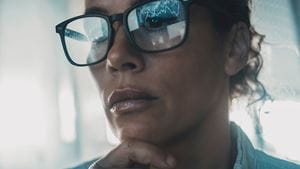
Blue light eyeglasses have gained a lot of interest over the last 5-10 years, particularly during the COVID-19 pandemic when so many people were working long hours on computers at home.
The idea makes sense; who wouldn’t want to make use of a simple way to protect their eyes from potential harm by blue light?
More recently, however, researchers are questioning how effective the blue light-blocking glasses are – and how harmful blue light actually is to the human eye.
Hannah Sinsebox, OD, is an optometrist at Reed Eye Associates with Rochester Regional Health and explains what blue light is, whether blue light eyeglasses help patients who choose them, and other important questions for those who want to know.
Blue light is a range of high-energy wavelength light emitted by the sun, fluorescent and LED lightbulbs, and phone & tablet screens. Blue light wavelengths are along the typical UV light spectrum we experience every day.
Some studies have looked into whether blue light is harmful to the human eye and come to two main sources of concern. Blue light can lead digital eye strain, and can increase the risk of macular degeneration in some patients.
Despite these risks, evidence is inconclusive as to whether it is a significant cause for concern for the majority of people. There are many other factors that affect digital eye strain, including the length of time a person exposes themselves of a phone or tablet. And while blue light might increase the risk of macular degeneration, other risk factors raise macular degeneration risk even more, such as family history, smoking, obesity, and high blood pressure, according to the American Academy of Ophthalmology.
“There are still some ongoing studies about the effects of blue light on vision, but most of the studies in the last 5 years have been inconclusive as to whether there is harm,” Dr. Sinsebox said.
Visit One of Our Eye Care Locations
So do blue light glasses work? Dr. Sinsebox’s answer: It depends on the person’s lifestyle.
Aside from research showing blue light affects the body’s natural circadian rhythms and sleep schedules, there is not any conclusive evidence showing blue light-blocking lenses protect a person’s vision better than lifestyle adjustments.
Since blue light is emitted by phones and computer screens, people whose jobs are oriented around looking at phones or screens may find a slight benefit.
Most insurance plans cover blue light glasses, but patients should check with their providers.
There are several techniques people can use to avoid causing unnecessary strain to their eyes aside from wearing special lenses.
This is a suggestion for people who work on computers or use their phones for extended periods of time each day. Every 20 minutes, look at something other than your screen that is at least 20 feet away for at least 20 seconds.
Keeping a small bottle around the house or in an office desk drawer can be helpful. This can help to reduce eye strain, but also avoid dry eyes.
Phones often have brightness settings available for quick access on their control center or in the Settings app. Turning down the brightness to emit less blue light and turning on the Night Shift or Night Mode setting to change blue light settings after certain hours can also be helpful.
Everyone is more exposed to blue light when they are out in the sun than they are on their phone. Any measure of eye protection helps, so polarized sunglasses and even transition lenses provide some amount of protection.
“When looking at the big picture, there are people who are fully in favor of blue light-blocking eyewear and there are those who are not,” Dr. Sinsebox said. “It will not cause anyone harm to wear blue light-blocking glasses, so patients should keep this in mind when considering if these types of glasses are right for them.”
